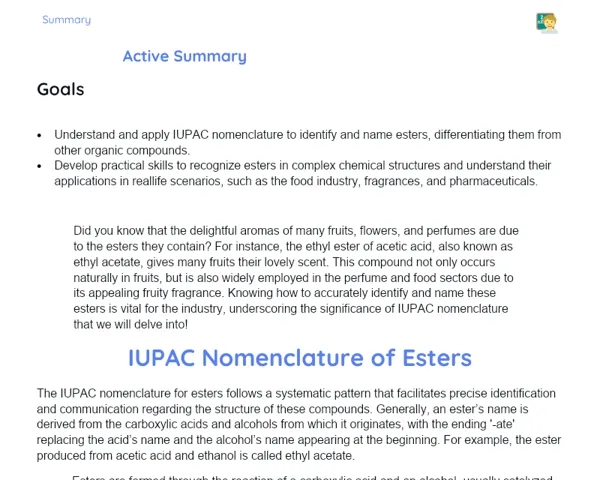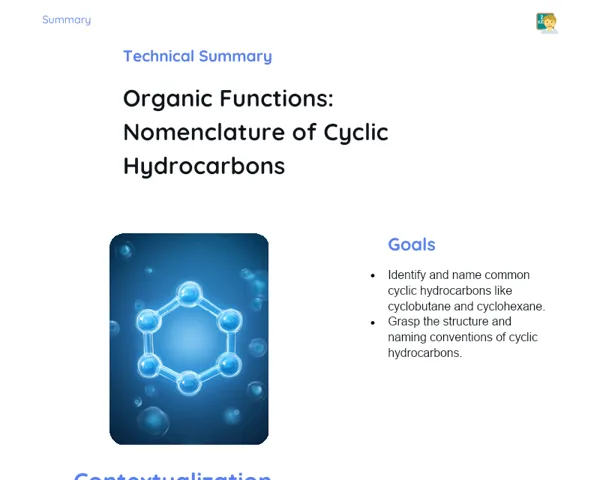Socioemotional Summary Conclusion
Goals
1. 🌟 Identify and compare the solubility of various organic compounds in water and organic solvents.
2. 🌟 Develop an awareness of the emotions we experience while learning and how they impact our understanding of the subject matter.
Contextualization
🧪💧 Have you ever thought about why ghee doesn't mix with water? Or why certain medications need to be dissolved in alcohol? The solubility of organic compounds is crucial for grasping these and many other everyday scenarios! Let's dive in together to unravel how this works and simultaneously learn to better manage our own emotions during the journey! 🚀
Exercising Your Knowledge
Solubility in Water
Solubility in water is a crucial concept for understanding how various organic compounds react in polar environments. Water is a polar solvent, meaning it's good at dissolving polar or ionic substances through its ability to form hydrogen bonds. For instance, compounds like alcohols dissolve in water because of the hydroxyl (OH) functional groups, which form hydrogen bonds with water molecules.
-
Polarity: Water is polar and readily dissolves polar substances.
-
Hydrogen Bonds: Compounds with hydroxyl groups (OH) can dissolve in water through hydrogen bonds.
-
Emotional Influence: Grasping this concept fosters feelings of curiosity and accomplishment when realizing its practical applications in daily life.
Solubility in Organic Solvents
Organic solvents such as hexane are nonpolar and typically dissolve nonpolar organic compounds. This occurs due to the similarity in the intermolecular forces between the solute and solvent. For example, hydrocarbons like octane are soluble in hexane because both exhibit London dispersion forces between their molecules.
-
Intermolecular Forces: London dispersion forces dominate in nonpolar solvents and their solutes.
-
Like Dissolves Like: Nonpolar compounds dissolve in nonpolar solvents.
-
Connection to Daily Life: This idea is evident in simple tasks like mixing cooking oils or fats with organic solvents.
Factors Influencing Solubility
Several factors affect the solubility of organic compounds, such as polarity, chain length, and the presence of functional groups. These aspects determine how and to what degree an organic compound can dissolve in different solvents.
-
Polarity: 'Like dissolves like'—polar substances dissolve in polar solvents while nonpolar substances dissolve in nonpolar solvents.
-
Chain Length: Longer carbon chains decrease solubility in water but increase solubility in organic solvents.
-
Functional Groups: Groups such as hydroxyl (OH) and carboxyl (COOH) enhance water solubility because they can form hydrogen bonds.
Key Terms
-
Solubility: The capacity of a solute to dissolve in a solvent and form a homogeneous solution.
-
Organic Compounds: Substances containing carbon that form covalent bonds with elements like hydrogen, oxygen, and nitrogen.
-
Polarity: The characteristic of a molecule with an uneven distribution of electric charges, leading to a positive and negative end.
-
London Dispersion Forces: Weaker intermolecular forces present in all molecules, especially significant in nonpolar compounds.
-
Hydrogen Bonds: Strong attractions between molecules due to the hydrogen atom bonded to an electronegative atom interacting with another electronegative atom.
For Reflection
-
How can understanding the solubility of organic compounds aid in making conscious choices of chemicals for use in labs or at home?
-
In what ways can recognizing emotions during the learning process affect your academic performance and social interactions?
-
What strategies can you implement to handle feelings of frustration or anxiety during experimental tasks, and how might these be applied in other aspects of your life?
Important Conclusions
-
🌟 We realize that the solubility of organic compounds is influenced by polarity, chain length, and the existence of functional groups.
-
🧪 Polar solvents like water dissolve polar substances, while nonpolar solvents like hexane dissolve nonpolar substances.
-
💡 We can apply the knowledge gained in practical, everyday situations, like understanding the mix of oil and water.
-
📚 We must reflect on the importance of our emotions in the learning process, as they can heavily influence our understanding and performance.
Impacts on Society
The solubility of organic compounds directly affects our daily lives—ranging from how effective medications are to how we cook. Knowing which compounds dissolve in which solvents can enhance simple processes, such as laundry, by choosing the appropriate solvent to remove stubborn grease stains.
On an emotional level, recognizing how these scientific concepts apply to our everyday lives can cultivate a sense of curiosity and accomplishment in students. This not only improves understanding but also encourages more thoughtful and informed decision-making in both academic and daily contexts.
Dealing with Emotions
Let's utilize the RULER method to manage emotions while studying solubility. First, Recognize your feelings during a chemistry experiment—could be curiosity, frustration, or excitement. Next, Understand the reasons behind these emotions. Is it the complexity of the topic or the pressure to succeed? Label it clearly: is it anxiety, enthusiasm, or something else? Then, Express your feelings appropriately—talk it out with friends or jot down your experiences. Finally, Regulate your emotions by perhaps taking a small break or reminding yourself that making mistakes is part of the learning journey. Try these steps the next time you study and observe the difference!
Study Tips
-
📝 Go through your notes and try to connect theory with practical situations from your daily life.
-
🤝 Form study groups to discuss the topic. Sometimes, hearing different viewpoints can help clarify concepts that seem complicated.
-
📖 Utilize extra resources such as videos and online articles to bolster what was learned in class and deepen your understanding.



